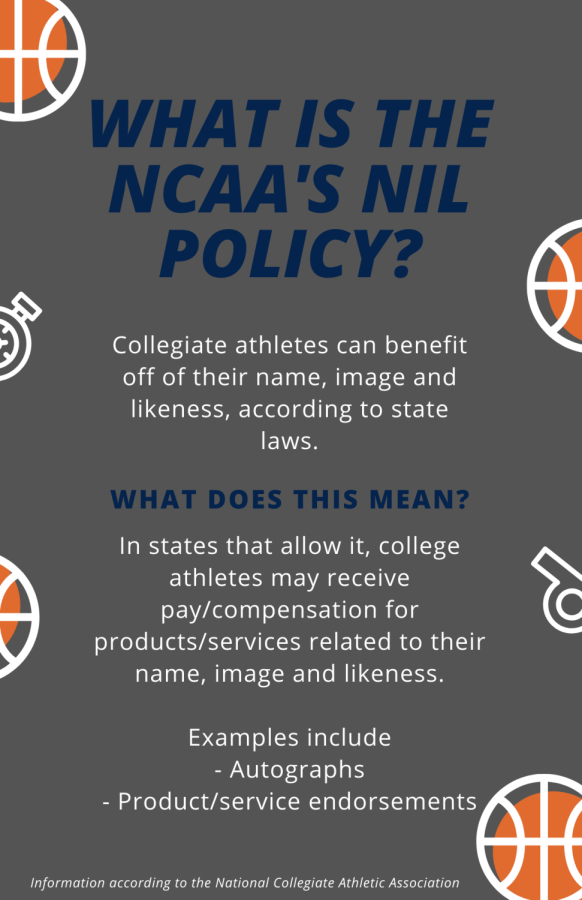NCAA NIL rule change leaves athletes wanting more
NCAA NIL rules allow athletes to benefit from their name, image and likeness.
April 27, 2022
NCAA guidelines have changed since the collegiate athletics governing body passed new rules stating student-athletes may receive pay, sponsorships, endorsements, and compensation. Yet, student-athletes at UNC Asheville and across the country are demanding for more.
“It feels like a full-time job, and it is. With all the games and practices tied together with class and tests, it can get to us throughout the semester. We put up with it because we love our sport,” said Silas Goss, junior on the men’s soccer team.
Student-athletes across UNCA said time management is the hardest thing to juggle when being a student-athlete.
“It’s hard when you are trying to balance academics with practice, games and traveling. Even when we’re on our off season, it feels like it’s still a regular season. Only difference is that there are fewer games,” Goss said.
When the NCAA name, image and likeness rule passed, Erin Spence, assistant athletic director for compliance, said the new provision gives student-athletes the same opportunity that non student-athletes have always had to profit off their talents and skills.
Especially with the time constraints that come with competing as a collegiate athlete, profiting off of NIL may present student-athletes with more feasible avenues for income and compensation, according to Spence.
“For student-athletes, trying to have a full-time job is nearly impossible. For the student-athletes that aren’t on full scholarships, this gives them a way to be able to make profit while still playing their sport,” Spence said.
Any student-athlete can benefit from their NIL, but according to some student-athletes, making profit alone isn’t enough.
“UNCA isn’t known as a sports school, so no student-athlete here can earn as much money as a student-athlete at a Power Five school. That’s why we want it to be fair all around because at the end of the day, we are all student-athletes,” Goss said.
There has been protest from student-athletes across the country voicing displeasure with the NCAA, with no student-athletes going unheard.
“It was about time they passed the rule that allows us to make profit off our NIL’s, but now it’s time to stand up for ourselves and speak on what we believe in. We’re not asking for a break from class, just to be heard,” said Colin Daughtry, senior on the men’s soccer team.
Student-athletes across the country are asking for more time for themselves. Jay Cutspec, UNCA director of health and counseling, can see the reasoning for student-athletes wanting more time.
“I think it’s difficult sometimes to be an athlete and I don’t think people understand the expectations that are on you guys. There’s a lot of unfair negative judgements that go along with that,” Cutspec said.
According to Cutspec, mental health of students and student-athletes is an issue and it’s getting recognized more as a factor in overall wellness.
“I believe mental health is a thing, and I’m glad we’ve seen more attention on the subject and especially from the professional athletes. We have also seen schools across the nation providing more help and counseling,” Daughtry said.
Despite student-athletes across the country asking for more support and benefits, there is no sign of protest at UNCA.
“We won’t see a change until one of the bigger schools asks for a change. Profit is different for whatever university you are attending, so we want something that can be equal to all student-athletes,” said Claudia Prieto, senior on the track team.
Student-athletes are trying to raise awareness through social media platforms, which is a powerful platform in our society today to create attention.
“I wish social media was as powerful back then as it is today. In college, and even before that, we didn’t have this platform and we would never be heard by the NCAA. Social media is powerful in a way, and it isn’t going away,” Prieto said.
Athletes at some larger universities like Clemson, Notre Dame, Pittsburgh and others have taken to social media to publicly voice these concerns about student-athlete compensation, competition and other issue areas.
“There has been discussion of making student-athletes just play one long season throughout both semesters. New ideas are always rising, so it’s not going to be the last time you hear about student-athletes wanting more than just profit off their NIL,” Goss said.
There are petition websites all over the internet with student-athletes voicing opinions against the decisions and rule-making from the NCAA.
“With so much young talent across the nation, and with professional teams beginning to start paying athletes in lower leagues, I soon believe that the sports in college will not be the way it is today. Players will want to skip college and go straight to the professionals, all thanks to the NCAA,” Daughtry said.



















